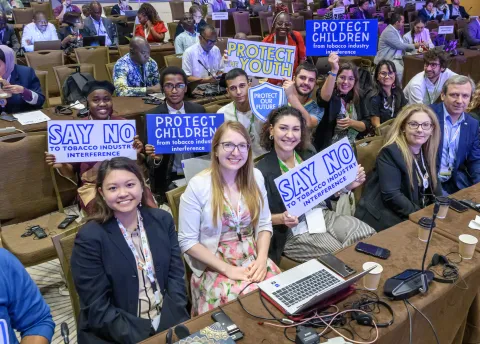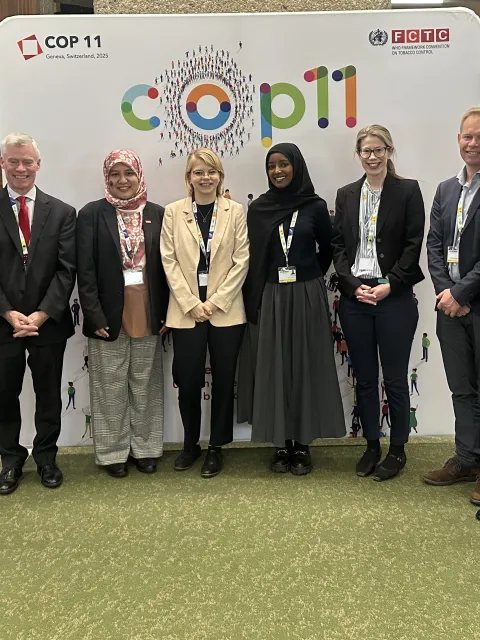World No Tobacco Day 2024: Protecting children from tobacco industry interference
In support of World No Tobacco Day on 31 May, UICC emphasises the need to address industry tactics that target youth and oppose anti-tobacco legislation, advocates for stringent controls to curb tobacco use, and provides materials and information to get involved.

HIGHLIGHTS
- Tobacco is a major contributor to various cancers, with smoking alone being responsible for 90% of lung cancer deaths.
- Despite a decline to 1.25 billion users, tobacco use, especially among 13 to 15-year-olds, presents a significant challenge.
- The tobacco industry's targeted tactics towards youth include marketing new products such as e-cigarettes, smokeless tobacco, snus, pouches, and using digital platforms to bypass traditional advertising restrictions.
- Ahead of World No Tobacco Day on 31 May on the theme of protecting youth, UICC is advocating for increased taxation, more smoke-free areas, and stricter regulations on sales and marketing of tobacco products and the exploitation of digital platforms to target young consumers.
Tobacco use is a major contributor to a host of cancers, including those affecting the oral cavity, lungs, liver, stomach, bowel, ovaries, and certain types of leukaemia. It is responsible for 25% of all cancer deaths worldwide, amounting to an estimated 2.5 million deaths annually. In particular, smoking accounts for about 85% of all lung cancer deaths, highlighting the critical need for concerted efforts to reduce tobacco use globally.
Indeed, while there has been a noticeable decline in global tobacco use from 1.36 billion in 2000 to about 1.25 billion users ages 15 and older, the decrease is less substantial than hoped. The numbers show that while tobacco control measures are effective in curbing consumption, sustained efforts are needed to see them implemented more widely. They also belie the tobacco industry’s sustained tactics to recruit young people as lifelong consumers.
World No Tobacco Day 2024
For more information and resources to support World No Tobacco Day visit our dedicated page.
More than 38 million young people aged between 13 and 15 are using some form of tobacco. Within the WHO European Region, tobacco use among 13 to 15-year-olds stands at 11.5% for boys and 10.1% for girls, indicating a substantial challenge in curbing youth tobacco consumption.
World No Tobacco Day (WNTD) on 31 May 2024 will be driven this year by the theme ‘Protecting children from tobacco industry interference’. The focus is on mobilising international efforts to enact stronger regulations that shield youth from harmful tobacco products and deceptive advertising practices.
"Tobacco use among the youth is alarmingly high, directly exposing them to increased cancer risks. This undermines efforts to reduce the number of people who develop cancer and die of it. We owe it to the next generation to protect them from tobacco products and deceptive online advertising, and counter the industry's aggressive tactics aimed at renewing the customer base."
— Yannick Romero, Senior Knowledge & Advocacy Manager, UICC
UICC has long advocated for stringent controls on marketing strategies for new products especially designed to appeal to youth – such as e-cigarettes, especially flavoured products, smokeless tobacco, snus, and pouches – aggressively promoted through social media.
UICC also supports increasing taxes on tobacco products to make them less affordable, and the development of smoke-free areas to protect youth from second-hand smoke and exposure to tobacco use.
The sophisticated use of digital platforms by tobacco companies to market to young people is also a signficant issue as it complicates enforcement of advertising restrictions. These companies exploit social media's pervasive reach, engaging influencers who often fail to disclose their associations with tobacco promotions.
In the month of May as World No Tobacco Day 2024 approaches, UICC will be addressing these issues in its website editorial content to raise awareness and facilitate discussions among policymakers, healthcare providers, and the general public.
Last update
Wednesday 24 April 2024
